Why the KHL is the right choice for Vladimir Bobylev to make his next step

Photo Credit: HC Spartak Moscow // KHL
Earlier this morning, HC Spartak Moscow announced their latest addition to a rapidly changing roster. To the surprise of many Leafs fans, that addition was Vladimir Bobylev, who was just drafted 122nd overall by the Toronto Maple Leafs three weeks ago. The 19-year-old signed a two-year contract with the KHL team with a two-way clause to give salary flexibility if he were to be sent down to the VHL, Russia’s second tier.
Relatively Speaking

If you can score in the KHL, you can probably score just about anywhere. While we spend a lot of time talking about the league being the “evil villain” of the hockey world, poaching players, offering big contracts, sometimes not actually paying those contracts, and having some level of insanity at pretty much all levels of the management umbrellas. But it’s also undeniably the second best league on the planet as far as talent is concerned, because of its ability to harvest the best players in the world who don’t get a chance to stick in the NHL, particularly the ones based in Europe.
Bobylev is going to make a huge jump here, which, considering his Draft+1 is realistically more of a Draft+2, is the right way to go. You can only do so much in junior, and after already having a year of getting important minutes on a very good team, a victory lap probably doesn’t do him a heck of a lot. Jack Walker, who was also an over-ager pick from the Royals, will likely graduate to the Marlies this year.
Bobylev’s 74 points in 77 games played with Victoria this year give him an NHLe of 21 points over 82 games. Multiplying and re-dividing to adjust for the talent gap between the NHL and the KHL, and the 22 fewer games played across the ocean gives a projection of a 19 point season if he were to have been there this year. Obviously, a lot of different factors come into play that can’t be solved by a simple multiplier, but it’s an encouraging projection for a teenager.
This is Spartak
Something that should be kept in mind about the KHL is the league’s absolute hesitance to play young players that aren’t very obvious talents. This is one of the reasons why we’ve been pitching Nikita Zaitsev as such a huge get on this site since we caught wind of his all-but-commitment to sign here back in October; at that point, he was a 24-year-old defenceman, in a league that uses four pairs, who was in his third year of getting heavy minutes and usage and thriving under them.
But certain teams and certain situations will be a little different. Spartak Moscow, the team that he’s joining, is a particularly interesting one. Spartak is a team with an illustrious history, having been founded in 1946, but have struggled financially over the past decade. They had to take a year off from the Russian Super League in 2006/07 as a result and had history repeat itself in 2014/15.
In most years, the team relies on underpriced veterans looking for some late-career hockey to play (Slava Kozlov, Alexander Suglobov, Marcell Hossa, Nikolai Zherdev and Jozef Stumpel come to mind from the past half-decade) to take up the bulk of the ice time. In 2013/14, for example, Pavel Medvedev played the most minutes of any forward under the age of 24. The 21-year-old played in a little over half the team’s games and averaged eight minutes a night.
Because of the year off, the team came back to the league last year with just two returning forwards in Artem Voronin and Filipp Toluzakov, worth of whom were bottom six forwards. While the team was younger than it’s ever been, with nine of its 21 forwards being U24, they still underused their most skilled youth. Sergei Shmelyov, for example, was second on the team and in the upper rankings of the league in all situations points per 60 minutes (2.4), despite this being his Age 22 season. Still, he played 15 minutes a night and often saw himself bouncing between lines 2 and 3.
Spartak appears to be working towards competitiveness again this year. Of the six other forwards they’ve added, their average age is 27.6. Not only is Bobylev going to have to prove that he can play against adults, he’s going to have to prove he can play with them too. A best case scenario would likely involve him playing minutes similar to Vyacheslav Leshchenko, who also averaged 15 or so minutes a game and scored 22 points in 54 appearances in his Age 20 season with Spartak last year.
Eyes and Ears
As far as Bobylev’s skillset goes, this is much more of a slam dunk. At 6’2 and about 200 pounds, he’s more than physically capable of handling his opponents. He’s already a reasonably strong skater, and heading back to Russia will no doubt help him build up his physical stamina on larger ice. Spartak might also have some use for his two-way ability; they were one of the worst defensive teams in the league last year, meaning late and situation shutdown minutes might be plentiful for him.
Final Thoughts
I’m a big fan of the idea of sending players to bigger and better challenges once they’ve proven themselves to have a grip on their current situation. There’s some truth to the idea that using your own talent disparity over weaker competition to experiment is beneficial as well, but if you’re already a creative player, upping the difficulty is the best way to go.
The KHL seems to be the best way of doing that for Bobylev. Seeing as his North American options, as a CHL draft pick, were the NHL or WHL, Europe was going to be the only way to up the difficulty, and in the KHL he gets both homeland familiarity and the most competitive league possible.
A two-year contract will make him 21-on-22 when he returns to North America. When is the key word here; players don’t just come across to chase an NHL dream and then disappear the month after getting drafted unless they get written out of their rightsholder’s plans. He’ll be about the same age coming back as Nikita Soshnikov (who he was teammates with in the MHL before moving to Canada) was when he came over. In Soshnikov’s case, he showed up with stellar KHL numbers, looked fantastic on the Marlies, and impressed in his time with the Leafs.
If the Leafs can get the same out of Bobylev, they’ll be thrilled. Turning a fifth round pick into impactful organizational talent in the span of two years is stellar (not to mention, not having to sign him to an ELC until at least 2018), and thoughts like that may have influenced their thought process at the draft this year. Bobylev has the skill, brawns, and now the development environment to make that happen; it’s now up to him to see what he can do with it.
Recent articles from Jeff Veillette





